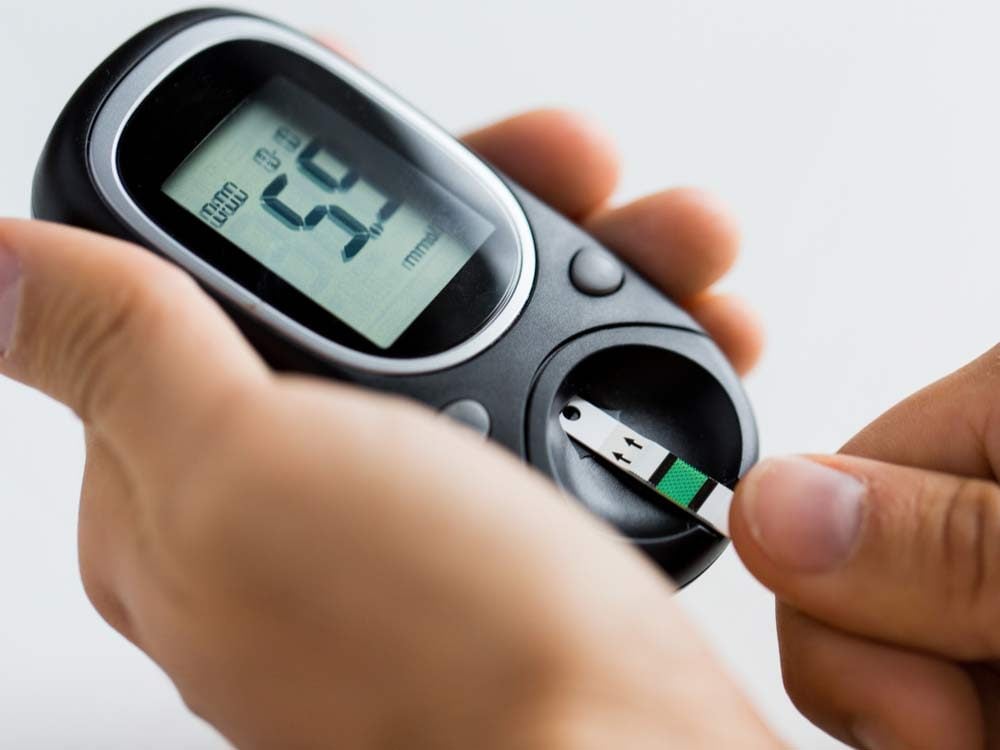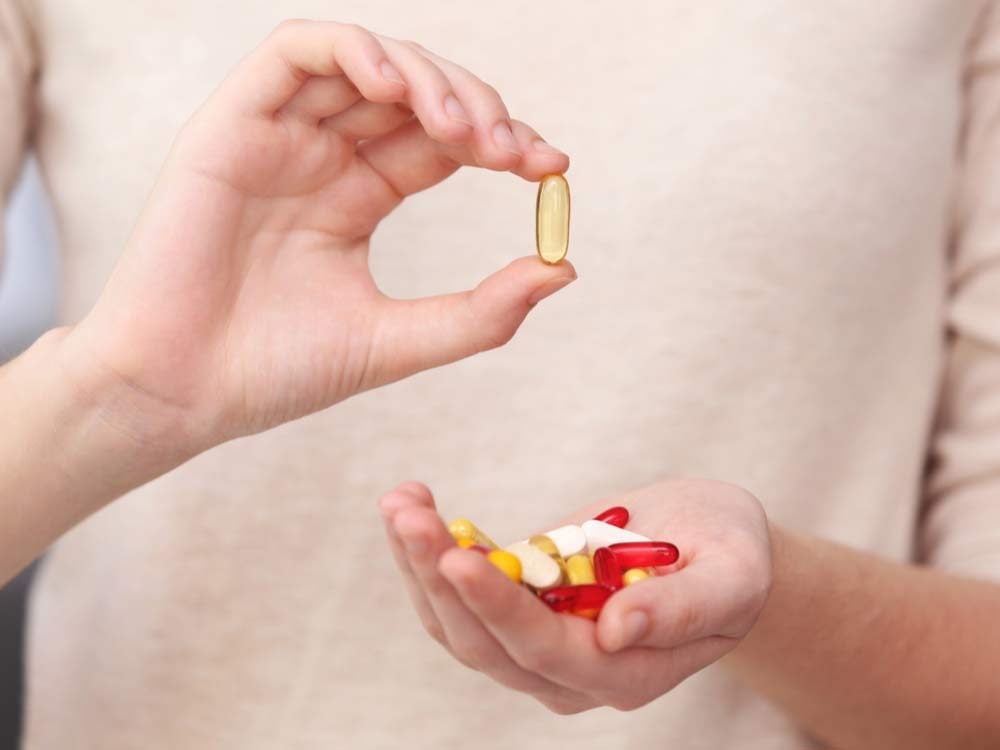Biotin Calcium Vitamin D
Biotin Calcium Vitamin D
6 Questions You Have About Biotin Supplements—Answered
Although it's renowned for its role in the development of healthy hair and nails, the health benefits of biotin—an important part of the B complex group of vitamins—extend beyond beauty. Here's why you might consider taking a biotin supplement.
1 / 6
 Photo: Shutterstock
Photo: Shutterstock
1. What Are Biotin Supplements?
It's surprising that biotin and pantothenic acid—two members of the vitamin B family—don't get more attention. Biotin (Vitamin H) and pantothenic acid (Vitamin B5) work together at the most basic level to produce enzymes that trigger many bodily functions. Biotin promotes healthy hair and nails and helps the body use carbohydrates, fats and protein. Pantothenic acid appears to play a valuable role in how the body deals with stress; it promotes healthy function of the central nervous system, helps the body use carbohydrates, fats and protein. It also may reduce cholesterol and speed up wound healing.
Biotin is found in liver, soy products, nuts, oatmeal, rice, barley, legumes, cauliflower, egg yolks, milk and whole wheat. Organ meats, fish, poultry, whole grains, yogurt and legumes are the best sources of pantothenic acid.
These eight vitamins are a total waste of money—and could even be dangerous.
ⓘ
2 / 6
 Photo: Shutterstock
Photo: Shutterstock
2. What Do Biotin Supplements Do?
Both biotin and pantothenic acid are involved in the breakdown of carbohydrates, fats and protein from foods and in the production of enzymes. Biotin plays a special role in helping the body use glucose, its basic fuel and it promotes healthy nails and hair. The body needs pantothenic acid to maintain proper communication between the brain and nervous system and to produce certain stress hormones.
Biotin may improve the quality of weak and brittle fingernails and may help slow hair loss if you have biotin deficiency. It is often found in hair and skin-care products. Research suggests that the overproduction of stress hormones during long periods of emotional upset, depression or anxiety increases the need for pantothenic acid, which is used to manufacture these hormones.
According to a study from Switzerland, biotin can increase the thickness of nails by an average of 25 per cent. Six months of taking biotin supplements improved brittle nails in two-thirds of the study's participants.
Biotin helps keep hair healthy, but—except in rare cases of biotin deficiency—it can't prevent baldness, as some claim. Nor can pantothenic acid forestall the normal greying of hair that occurs with age.
Here are 3 Shocking Things Your Nails Say About Your Health.
3 / 6
 Photo: Shutterstock
Photo: Shutterstock
3. What Are the Other Benefits of Biotin Supplements?
In high doses, biotin may help people with diabetes, increasing the body's response to insulin so blood sugar (glucose) levels stay low. In addition, it may protect against the nerve damage that sometimes occurs in diabetes (called diabetic neuropathy). Pantothenic acid has been shown to reduce cholesterol and triglyceride levels. It is used to help treat inflammatory conditions such as asthma and dermatitis, to increase stamina and athletic performance and to enhance wound healing.
Here are six of the best supplements to take after surgery.
4 / 6
 Photo: Shutterstock
Photo: Shutterstock
4. Why Are Biotin Supplements Beneficial for Those Who Eat Processed Foods?
If you eat a lot of processed foods, you should consider taking a supplement with pantothenic acid, because this vitamin is easily destroyed during food processing. Bread and cereal, for example, contain half the pantothenic acid found in the original whole grains. Even more pantothenic acid (70 per cent) is lost when poultry or fish is frozen and thawed or when beans are canned (80 per cent).
Here are 9 Superfoods for a Healthy Gallbladder Diet.
5 / 6
 Photo: Shutterstock
Photo: Shutterstock
5. How Do I Take Biotin Supplements?
Most people will get enough biotin and pantothenic acid from a daily multivitamin or a B-complex supplement. Individual supplements are necessary only to treat a specific disorder. An adequate intake of pantothenic acid is 6 milligrams a day for men and 4 milligrams for women, increasing to 5 milligrams during pregnancy and 6 milligrams when breastfeeding. The figures for biotin are 30 micrograms a day for men and 25 for women, increasing to 30 micrograms during pregnancy and 35 micrograms when breastfeeding.
These vitamins can be found in tablets, capsules and creams. Multivitamins and B-complex vitamins usually include biotin (also called vitamin H) and pantothenic acid (also called vitamin B5), and both are also available as individual supplements. The main form of biotin is D-biotin. Pantothenic acid comes in two forms: pantethine and calcium pantothenate. The latter is suitable for most purposes and is less expensive than pantethine.
For hair and nails: take 1000 to 1200 micrograms of biotin a day.
For diabetes: talk with your doctor about taking high doses of biotin to help or even prevent diabetic neuropathy. Diabetic neuropathy improvements may be noticed in 1 to 3 months.
For wound healing: dexpanthenol cream 5 per cent once or twice a day. To lower cholesterol take 300 milligrams of pantethine three times a day.
In most cases, take individual supplements with meals. Take pantothenic acid with water after meals.
Possible side effects include diarrhea and fluid retention (as a result of 10 grams or more of pantothenic acid a day). Contact dermatitis can occur with topical forms of pantothenic acid. Very high doses of biotin (more than 8 milligrams a day) used to treat diabetes may alter insulin requirements.
6 / 6
 Photo: Shutterstock
Photo: Shutterstock
6. What Happens If You Take Too Little or Too Many Biotin Supplements?
Deficiencies of biotin or pantothenic acid are almost unknown in adults. However, eating raw egg whites over a prolonged period can prevent biotin being absorbed, leading to a rash and neurological problems. Long-term use of antibiotics, sulfa drugs or anti-seizure medications can lead to less than optimal levels of biotin while antibiotics and the oral contraceptive pill may increase your need for pantothenic acid.
There are no known serious adverse effects from high doses of biotin or pantothenic acid. Some people report diarrhea when taking doses of 10 grams a day or more of pantothenic acid.
Check out 9 Signs That Could Mean You're Not Getting Enough Vitamin D.
Originally Published: January 17, 2018

Source: https://www.readersdigest.ca/health/healthy-living/should-you-be-taking-biotin-supplements/


Tidak ada komentar:
Tulis komentar